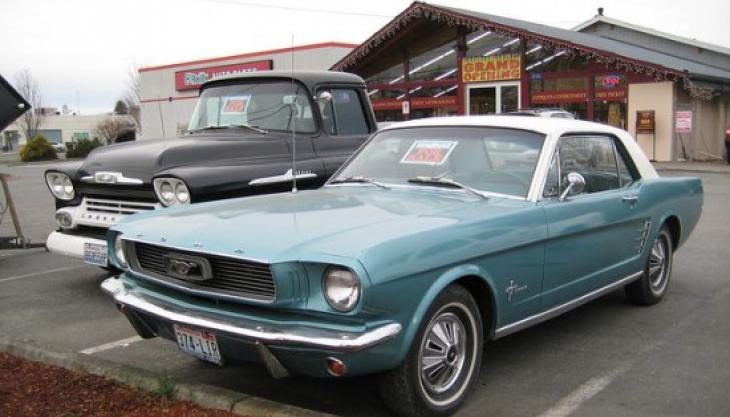5 Steps for Buying a Car After Bankruptcy – Tips for North Carolina Consumers
Submitted by Rachel R on Wed, 03/23/2016 - 9:18am

Need a car after bankruptcy? Check out these tips
Image Source: Flickr User JOHN LLOYD
For North Carolina consumers that have filed bankruptcy or are considering filing, a primary concern may be their vehicle. You need a car to get to work and take care of the necessities of life, but if you surrendered a vehicle in bankruptcy or kept your car but it needs replacing, you may need a car loan soon. You should be able to get a car loan after bankruptcy – so long as your work on your credit.
Here are five steps for buying a vehicle after North Carolina bankruptcy.
#1 Clean up your credit report and take steps to increase your score
After bankruptcy, it’s critical to clean up your credit report. A few months after your discharge, order copies of all three credit reports (you can get these free once a year). Look for any older items that should have fallen off your credit and request these are removed. For items included in your bankruptcy, ensure they show this way on all reports and reflect a zero balance.
Check for any public records like liens that need to be cleaned up and take care of those. Next is to rebuild your credit after bankruptcy. Start with a couple of low (or no) fee secured credit cards, use them wisely, pay off in full each month. Next, move on to unsecured cards and use sparingly and pay off in full each month. Monitor your score so you’ll know when it rises to the level you can get a car loan.
#2 Save up a down payment – or enough to buy a car
While you are working on improving your credit, you should build up a down payment. This is also the time to consider whether it’s better for you to save up a down payment then take out a car loan – or if it’s better for you to save up enough to buy a decent used car so you won’t have to deal with a monthly car payment. As a bonus, you can get cheaper insurance if you own the car outright. Weigh the options!
#3 Check out rebate opportunities
If you’re intent on purchasing a new car, you need to do your homework first to make sure you get the best deal. If you bank with a credit union, that can be a good place to start loan shopping. Some credit unions even have cars up for sale. Check out rebates, comparison shop between dealers and even bargain back and forth between dealers to try and get a better deal. Also, obtaining a pre-approval for a set loan amount first may give you more flexibility to bounce dealer to dealer looking for the best price.
#4 Consider a used car
New cars can sometimes come with advantageous low interest rates, but you’ll also get hit with a ton of depreciation when you drive off the lot. Why not consider a late model used car that comes at a much lower price than a brand new version of the same vehicle? Again, you can search for pre-approval on a used car loan then look for a car at or below the pre-approved limit so you can comparison shop. Often, buying from an individual can mean greater savings than buying off the used lot at a dealership.
#5 Buy within your means
The primary consideration is that you should not put your preference of vehicle above the limitations of your budget. A common budgeting benchmark is that transportation should consume no more than 15% of your take-home pay. That includes the cost of the car loan, maintenance, fuel costs and auto insurance. If your take home is $40k, that would be $512.
You will likely need at least a 580 FICO score to get a car loan, but the lower your score, the higher the interest rate will be. To get one of the advertised 0% finance rates, you need closer to a 750 FICO score in most cases. However, many times a dealer will offer the choice of a rebate OR 0% financing and you may be better off accepting the rebate – you just have to crunch the numbers to see what’s best.
If you’re struggling with debt, dealing with collection calls, and stressed out about debt, don’t live this way! Contact the Law Offices of John T Orcutt for a free North Carolina bankruptcy consultation today. Call +1-833-627-0115 now for a free no-obligation appointment at one of our convenient locations in Raleigh, Durham, Fayetteville, Wilson, Greensboro or Wilmington.
Debts Hurt! Got debt? Need help? Get started below!
Serving All of North Carolina
- Bankruptcy Attorneys Raleigh NC (North)
- Bankruptcy Attorney Fayetteville NC
- Bankruptcy Attorney Durham NC
- Bankruptcy Attorneys Wilson NC
- Bankruptcy Attorneys Greensboro NC
- Bankruptcy Attorneys Southport NC
- Bankruptcy Attorneys Wilmington NC
Bankruptcy Attorneys Raleigh NC (North)
6616 Six Forks Rd #203 Raleigh, NC 27615 North Carolina
Tel: (919) 847-9750

Bankruptcy Attorney Fayetteville NC
2711 Breezewood Ave Fayetteville, NC 28303 North Carolina
Tel: (910) 323-2972

Bankruptcy Attorney Durham NC
1738 Hillandale Rd Suite D Durham, NC 27705 North Carolina
Tel: (919) 286-1695


Bankruptcy Attorneys Greensboro NC
2100 W Cornwallis Dr. STE O Greensboro, NC 27408 North Carolina
Tel: (336) 542-5993

Bankruptcy Attorneys Southport NC
116 N Howe St. Suite A Southport, NC 28461 North Carolina
Tel: (910) 218-8682

Bankruptcy Attorneys Wilmington NC
116 N. Howe Street, Suite A Southport, NC 28461 North Carolina
Tel: (910) 447-2987
